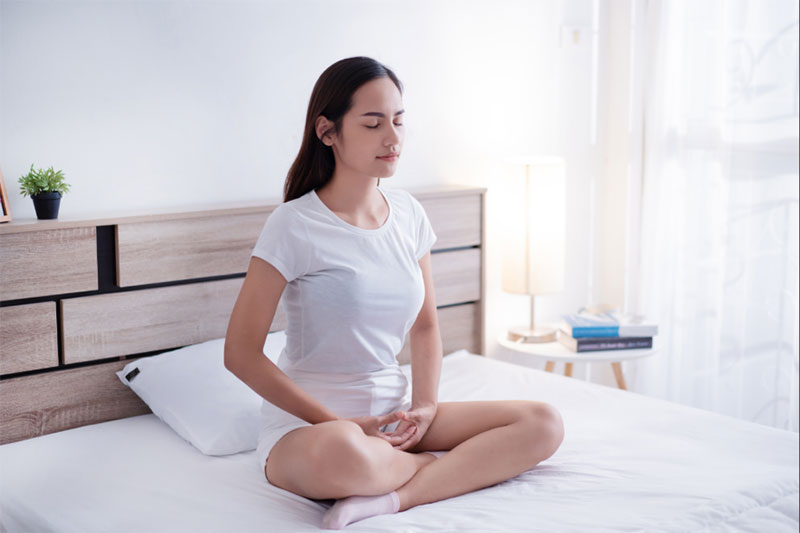4 Tips To Get A Better Sleep At Night
Sleeping may seem like a pretty easy task to do. You lay down in bed at night, close your eyes, and expect yourself to naturally fall asleep after a few minutes. But in reality, many people find it difficult to get enough hours of sleep every night. As they wait for themselves to fall asleep, they end up tossing and turning until they realize it’s almost the wee hours of the morning.

One of the reasons why it’s getting harder for people to sleep at night is because they refuse to do so. As you get older, you become more committed to your work, chores, studies, and other responsibilities, and the first thing you sacrifice is your sleep. You’d rather stay up all night and finish what you need to do than give yourself enough time to rest. Eventually, your body gets used to sleep deprivation. By the time you’re finally ready to sleep early, it’s almost an impossible goal to reach.
While it may be a good thing to finish all your tasks for the day before turning in, it can be bad news for your well-being. Depriving yourself of sleep every night will not only deplete your energy for the next day, but it can cause long-term effects on your health and may lead to various physical and mental issues. So before it’s too late, you should look into some of the ways you can improve your sleep hygiene.
Below are four tips to help you sleep more soundly every night.
- Stick To Your Body’s Sleep-Wake Cycle
Due to your hectic schedule in the morning and perhaps even at night, you may forget to structure your entire day around your body’s natural sleep-wake cycle. Your sleep-wake cycle, also known as circadian rhythm, is your brain’s 24-hour internal clock responsible for regulating cycles of sleepiness and alertness depending on the light changes in our environment.
When you have a consistent circadian rhythm, sleeping at night and waking up in the morning will be a walk in the park for you. On the other hand, if your circadian rhythm is out of whack, you’ll often find yourself wide awake at night and unable to experience sleepiness at all. If you think you’re one of the millions of people who have circadian rhythm disorders, it’s time to change your habits and stick to your sleep-wake cycle.
To start, try to sleep and wake up at the same time every day. Make sure you also do this on your days off and on weekends. This is to help set your internal clock to a proper sleeping schedule. Your bedtime should be around the hour when you usually feel tired. Sooner or later, you may notice that you’re waking up at the same time every morning without needing an alarm clock.
- Improve Your Sleep Hygiene
Aside from your body clock, another factor that affects the quality of your sleep is your sleep hygiene. This may include any nighttime habits before going to bed and the sleeping environment you currently have.
Some people have a hard time going to sleep because their minds are filled with worries, unnecessary thoughts, and other emotions generated from that day. To sleep more easily, you need to implement nighttime habits to ease your mind, relax your body, and prepare yourself for sleeping. This guide provides you with more in-depth details about proper sleep hygiene and routines you may need to start doing if you’re having a hard time sleeping.
Some relaxing activities you can do at night that can help you sleep quickly include:
- Taking a hot shower
- Reading your favorite book
- Listening to soothing music
- Meditating or doing yoga
- Doing self-massage
- Writing on your journal
- Doing breathing exercises

Meanwhile, some of the activities you must avoid doing before your bedtime include:
- Watching TV
- Playing video or mobile games
- Scrolling through your phone
- Doing an intense workout
- Checking work emails
- Bringing your pet to bed with you as they can potentially disturb your sleep in the middle of the night
Moreover, as much as possible, make an agreement with yourself that your bedroom is solely for sleep and intimacy only. Otherwise, it’ll be harder for you to wind down in your bedroom if you’ve associated it with many activities.
- Be Mindful Of Your Eating And Drinking Habits
Another factor that affects your sleep quality is your eating and drinking habits before bedtime. Whenever you can, avoid eating heavy meals for dinner. Better yet, have your dinner at least two to three hours before your scheduled bedtime. That way, your digestive system will still have enough time to finish its job of processing the food you eat. Meanwhile, consuming large meals close to bedtime means your digestive system will have to work extra hard throughout the night, so your brain is also awake and active. Plus, you might deal with stomach problems that will further disrupt your sleep.
Additionally, avoid drinking alcohol before going to bed. It may temporarily make you dizzy and doze off, but once the alcohol fades out, you may find yourself waking up at midnight. The same goes for coffee. If you can’t avoid caffeine, it may be best to drink only one cup every morning. Drinking caffeine close to bedtime will surely make it more difficult for you to even keep your eyes closed.
- Improve Your Sleeping Environment
You may be following consistent bedtime routines every night, yet you still find it hard to fall asleep. Perhaps it has to do with your sleeping environment—in other words, your bedroom. A peaceful and cozy bedroom will send signals to your brain that it’s time to relax and prepare for sleep. To make your bedroom ideal for sleeping, here are some aspects of it that you should consider checking:
- Your mattress must be comfortable enough for your back so you won’t wake up with neck and back pain in the morning. The same goes for your pillows and bedsheets. Check out Nolah Mattress to find pillows and mattresses that match the type of sleeper you are, and combine them with quality bedsheets to maximize comfort for your skin.
- Your room lighting must not be too bright as too much light will disrupt your sleep. It’s best to go for low and dim lighting at night.
- Your room temperature must not be too cold nor too hot. You can add calming houseplants to cleanse the air in your bedroom and help you relax.
- If your house happens to be near bustling city streets, you can use earplugs to drown out all the noise.
Most importantly, don’t forget to make your bed after you wake up. The last thing you’d want to see after going home from a long day is a messy bedroom and tangled sheets.
Conclusion
Getting better sleep at night may seem like a Herculean undertaking for you at this point. However, following these suggestions can help you slowly improve your sleeping habits and enhance your sleep quality. Remember that sleep is just as crucial as diet and exercise when it comes to health, so it’s a must to get enough of it no matter how busy you are.



